Related Research Articles
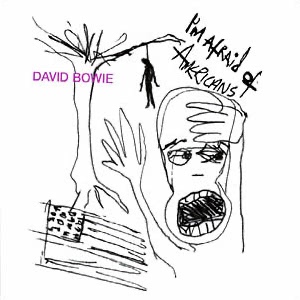
"I'm Afraid of Americans" is a song by the English musician David Bowie, released as a single from his album Earthling on 14 October 1997 through Virgin Records. The song was co-written by Bowie and Brian Eno and originally recorded during the sessions for Bowie's 1995 album Outside; this version was released on the soundtrack of Showgirls (1995). The song was then remade during the sessions for Earthling, featuring rewritten lyrics, overdubs and transposed verses. An industrial and techno track, it presents a critique of America through the eyes of a stereotypical "Johnny" and is characterised by drum patterns, synthesisers, various loops and vocal distortions.
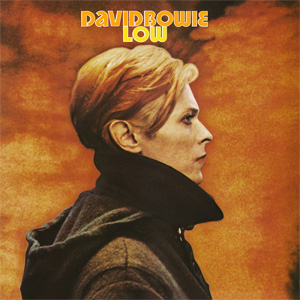
Low is the eleventh studio album by the English musician David Bowie, released on 14 January 1977 through RCA Records. The first of three collaborations with the producer Tony Visconti and the musician Brian Eno that became known as the Berlin Trilogy, the project originated following Bowie's move to France in 1976 with his friend Iggy Pop to rid themselves of their drug addictions. There, Bowie produced and co-wrote Pop's debut studio album, The Idiot, featuring sounds the former would explore on his next record. After completing The Idiot, sessions for Low began at Hérouville's Château d'Hérouville in September 1976 and ended in October at Hansa Studios in West Berlin, where Bowie and Pop had relocated.
"Warszawa" is a mostly instrumental song by David Bowie and Brian Eno originally released in 1977 on the album Low. The band Joy Division was initially called Warsaw as a reference to this song.
"Joe the Lion" is a song by David Bowie in 1977 for the album "Heroes". It was produced by Bowie and Tony Visconti and features lead guitar by Robert Fripp.
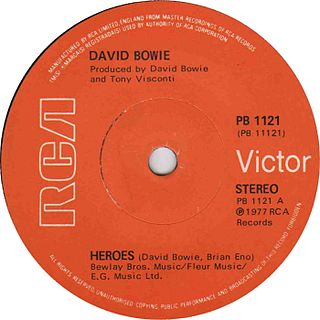
"'Heroes'" is a song by the English musician David Bowie from his 12th studio album of the same name. Co-written by Bowie and Brian Eno and co-produced by Bowie and Tony Visconti, the song was recorded in mid-1977 at Hansa Studio 2 in West Berlin. The backing track was recorded fully before lyrics were written; Bowie and Eno added synthesiser overdubs while Robert Fripp contributed guitar. To record the vocal, Visconti devised a "multi-latch" system, wherein three microphones were placed at different distances from Bowie and would open when he sang loud enough. Like other album tracks, he improvised lyrics while standing at the microphone.
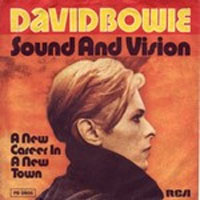
"Sound and Vision" is a song by the English musician David Bowie. It was released in January 1977 by RCA Records on side one of his 11th studio album Low. RCA later chose it as the first single from the album. Co-produced by Bowie and Tony Visconti, the song was recorded at the Château d'Hérouville in Hérouville, France, in September 1976, and completed at Hansa Studios in West Berlin in October and November. The song began as a simple G major chord progression that Bowie gave to the backing musicians, writing and recording his vocals afterward. It features backing vocals from Brian Eno and Visconti's then-wife Mary Hopkin.
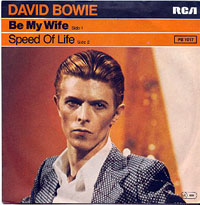
"Be My Wife" is a song by English musician David Bowie from the 1977 album Low. It was released as the second single of the album on 17 June 1977.

"Breaking Glass" is a song by the English singer-songwriter David Bowie. It was co-written by Bowie, bassist George Murray and drummer Dennis Davis in September 1976. Originally a track on Bowie's 1977 album Low, a reworked version of the song was a regular on the Isolar II Tour. A live version from that tour was used as the lead track on a 7-inch EP to promote his second live album, Stage in 1978. The EP reached number 54 on the UK Singles Chart in December 1978.

"Boys Keep Swinging" is a song by English musician David Bowie, released on 27 April 1979 by RCA Records in the United Kingdom as the lead single from his 1979 album Lodger. It was written by Bowie and Brian Eno and recorded in Montreux and New York City in September 1978 and March 1979. The recording utilised techniques from Eno's Oblique Strategies cards, which resulted in the musicians swapping instruments. Adrian Belew contributed a guitar solo, which he played receiving little guidance and was composited from multiple takes. The song was also built on the same chord sequence as the album track "Fantastic Voyage". Musically, "Boys Keep Swinging" contains elements of glam rock, funk and new wave, while lyrically, the song deals with the concept of gender identity, featuring various gender-bending lyrics. Bowie himself stated that the song was full of irony.

The Berlin Trilogy consists of three studio albums by English musician David Bowie: Low, "Heroes" and Lodger (1979). Bowie recorded the albums in collaboration with English musician Brian Eno and American producer Tony Visconti. The trilogy originated following Bowie's move from Los Angeles to Europe with American singer Iggy Pop to rid themselves of worsening drug addiction. Influences included the German krautrock scene and the recent ambient releases of Eno.

"Speed of Life" is the first instrumental by David Bowie. It is the opening track for his album Low from 1977.
"What in the World" is a song by David Bowie released on his 1977 album Low, later making appearances as repertoire in the 1978 world tour as well as other major tours.
"Art Decade" is an instrumental by English singer-songwriter David Bowie, released on his 1977 album Low.
"Weeping Wall" is an instrumental piece by David Bowie from his album Low, released in 1977.
"Subterraneans" is a song by David Bowie, the closing track of his 1977 album Low. As with most of Side 2, "Subterraneans" is mostly instrumental, with brief, obscure lyrics sung near the song's end.

"Look Back in Anger" is a song written by English artists David Bowie and Brian Eno for the album Lodger (1979). It concerns "a tatty 'Angel of Death'", and features a guitar solo by Carlos Alomar.

"Thursday's Child" is a song recorded by David Bowie for his twenty-second studio album Hours (1999). Written by Bowie and Reeves Gabrels, the song was released as the album's lead single on 20 September 1999, by Virgin Records.
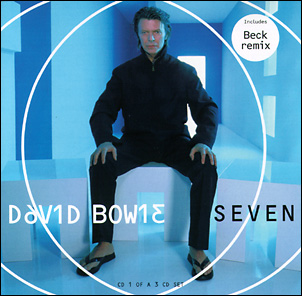
"Seven" is a song written by David Bowie and Reeves Gabrels for the album Hours in 1999. As with some of the other songs from Hours it was originally written for the computer game Omikron - The Nomad Soul from 1999. In July 2000, it was released as the fourth single from the album. The version used in the Omikron – The Nomad Soul was called "Demo version" on the single releases.
The Hours Tour was a small-scale promotional concert tour by the English singer-songwriter David Bowie comprising a handful of live performances and numerous television appearances in support of the album Hours in late 1999. Several live songs from the tour were included as b-sides to singles from the album, and concert recordings from the tour were released in 2020 as Something in the Air and in 2021 with David Bowie At The Kit Kat Klub .

Brilliant Live Adventures [1995–1999] is a box set by English musician David Bowie, released incrementally throughout late 2020 and early 2021 as a series of six live albums taken from various concerts performed in support of Outside (1995), Earthling (1997) and Hours (1999). Named after the Hours song "Brilliant Adventure", the box set contains a mix of edited single shows and compilations from multiple concerts.
References
- 1 2 3 Hugo Wilcken. 33&1/3: Low. Continuum. p. 92.
- ↑ "David Bowie remembers Berlin: "I can't express the feeling of freedom I felt there" - Page 7 of 12 - Uncut". Uncut. 2017-01-06. Retrieved 2018-06-02.
- ↑ "Ch-Ch-Ch-Changes: David Bowie's 'Brilliant Live Adventures' Series Continues with 'Live Paris 99'". 24 February 2021. Retrieved 24 February 2021.
- ↑ "BLA Part 6 - David Bowie At The Kit Kat Klub (Live New York 99)". 17 March 2021. Retrieved 17 March 2021.